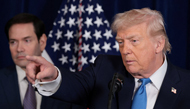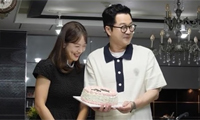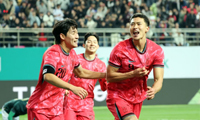By Ryu Jin
Staff Reporter
The approval rating of the main opposition Grand National Party (GNP) surged to 37.9 percent as of late last month, more than double that of the ruling Uri Party, according to a survey by The Korea Times.
In the opinion poll conducted Oct. 27-28 after the Oct. 26 by-elections in which the GNP swept all four National Assembly seats up for grabs, nearly four in every 10 South Koreans predominantly conservative party as their preferred political party.
It is quite rare that the largest opposition party enjoyed such a high approval rating as it has hardly exceeded the 30 percent level in most opinion surveys in recent years. Experts attributed the unusually high score to the ``election-time’’ political situation.
With President Roh Moo-hyun showing quite a low job approval rating (29 percent), the GNP appears to have largely taken advantage of the ruling camp’s poor performance rather than its own policy perspectives, political analysts said.
About 21 percent of the respondents chose the liberal Uri Party as their preferred political party, showing a widening gap with the GNP in recent months. The small opposition Democratic Labor Party (DLP) and the Democratic Party followed as the third and fourth favored parties with approval ratings of 7.5 and 3.5 percent, respectively.
However, around 28.6 percent answered that they did not favor one party over another or gave no response, showing their apathy for politics.
By age, the GNP was more favored by those in their 40s, 50s and 60s while the Uri Party was more popular among those in their 20s, a large portion of them university students. The progressive DLP received relatively high support from white-collar workers in their 20s and 30s.
The GNP was strongly supported in the Kyongsang region, the conservative party’s traditional stronghold. More than half of the residents in Taegu, Pusan and the surrounding Kyongsang provinces gave support to the party. The ruling Uri Party even received support across the nation, though the rating was a bit higher in the Cholla regions.
When asked about the parliamentary by-elections, a great majority of the polled attributed the Uri Party’s defeat to its failure to play a role of the nation’s governing party (45.4 percent) or Roh’s poor performance (38.3 percent). Analysts pointed out that it was not because the GNP did well as the main opposition party but because it took advantage of the ruling camp’s poor achievements.
On the desirable political power structure for the nation, 45.2 percent said the current five-year, single-term presidential system should be maintained. Another 26.9 percent favored a U.S.-style four-year presidential system in which a head of state could seek re-election. Those who want a dual executive system and parliamentary Cabinet system accounted for 15.7 and 10 percent, respectively.
jinryu@koreatimes.co.kr
스마터리빙
more [ 건강]
[ 건강]이제 혈관 건강도 챙기자!
[현대해운]우리 눈에 보이지 않기 때문에 혈관 건강을 챙기는 것은 결코 쉽지 않은데요. 여러분은 혈관 건강을 유지하기 위해 어떤 노력을 하시나요?
 [ 건강]
[ 건강]내 몸이 건강해지는 과일궁합
 [ 라이프]
[ 라이프]벌레야 물럿거라! 천연 해충제 만들기
 [ 건강]
[ 건강]혈압 낮추는데 좋은 식품
[현대해운]혈관 건강은 주로 노화가 진행되면서 지켜야 할 문제라고 인식되어 왔습니다. 최근 생활 패턴과 식생활의 변화로 혈관의 노화 진행이 빨라지고
카테고리 최신기사
- 4기 폐암 치료
- 운명의 한일전, 韓 4강 진출 시 확정... ‘어떻게 이런 행운이’ 日 준결승 선착, 승부차기 끝에 요르단 격파
- 뜨거운 ‘韓日 동맹 라인’ 이토 AS→김민재 골 ‘열도 홀렸다’... 일본 “콤파니 황태자들, 완벽히 해냈다” 찬사
- 마인츠, 하이덴하임 2-1 꺾고 ‘꼴찌 탈출’
- ‘환상 1호골+최고 평점’ 김민재 특급 맹활약, 뮌헨에서 가장 빛났다... ‘17G 무패’ 압도적 우승 페이스
- 이재성이 마인츠 살렸다! 2경기 연속 ‘미친 택배’ 도움... 마인츠, 하이덴하임 잡고 드디어 ‘꼴찌 탈출’
- 한국 U23 아시안컵 8강 상대 ‘호주’ 확정... 중국은 D조 2위 진출
사람·사람들
more
인터뷰-한국어진흥재단… “한국어 확대 체계적으로”
차세대 한국어 및 한국문화 교육을 목표로 활동해 온 한국어진흥재단이 2026년 제16기 이사회에서 유니스 이 이사를 신임 이사장으로 선출하며 …

캘리포니아 태권도협회 이취임식
캘리포니아 태권도협회(CTU) 신년회 및 회장 이·취임식 행사가 지난 10일 오렌지카운티 한인회관에서 열렸다. 이날 행사에서는 용호재 관장이 …
1945년 해방둥이 모임 신년모임
올해로 창립 11주년을 맞은 1945년생 해방둥이 모임(회장 최용자)은 지난 10일 해피 노래교실에서 신년모임을 열고 회원 간 친목을 다졌다.…
전남대 남가주 동문회 신년회
전남대 남가주 총동문회(회장 차흥주)는 지난 10일 아리수 식당에서 동문과 가족들이 참석한 가운데 2026년 신년회를 개최했다. 이날 참석자들…
도산사업회 신년하례식 26일 아로마센터 5층
미주 도산안창호기념사업회(회장 데이빗 곽)는 오는 26일(월) 오후 5시30분 LA 한인타운 아로마센터 5층 더원 뱅큇홀에서 ‘2026 신년하…
많이 본 기사
- “인천공항서 생돈 ‘50만원’ 날렸어요”…엉엉 운 외국인 관광객, 왜?
- 전자담배 폭발해 차까지 불타고 사용자 심한 화상…코트 주머니 속에서 갑자기 ‘펑’
- “트럼프, 가자 평화이사회로 우크라·베네수 갈등 중재도 타진”
- “법무부, ‘이민단속 방해 혐의’ 미네소타 주지사 등 수사”
- ‘징역 5년’ 첫 단죄 尹 남은 재판만 7개…내달 내란 선고
- 지상렬, ♥신보람과 열애 인정 후 첫 동반 등장..애칭=자기 [살림남]
- 트럼프 대통령이 의장맡은 ‘가자 평화委’ 위원 루비오·블레어 등 7인
- 구글, ‘검색 독점’ 판결에 항소… “사람들이 원해서 썼을뿐”
- “17살 손자가 암이래요”…81세 백발 할머니가 게임 유튜버로 데뷔한 이유
- 위대한 통일 비전이 위대한 나라를 탄생시킨다
- 美 “반도체관세 국가별로 합의”…대만기준 韓에 동일적용 아냐
- 트럼프, 이란 군사옵션 잠정보류?… “교수형 취소가 큰 영향”
- “모델 같은 얼굴, 재산 노렸나” 박나래 전 남친 사태..기안84 발언 ‘파묘’
- 美, 이르면 내달 54년만의 달궤도 유인비행…17일 로켓 발사대로
- 트럼프의 마러라고 자택 인근 도로 ‘트럼프 불러바드’로 개명
- 대장암 위험 높이는 생활 속 잘못된 습관 5가지
- ‘휴대폰 많이 하면 암 걸린다’ 이 말 진짜?… 보건 당국, 새로운 연구 들어갔다
- 국립공원 방문시 시민권·영주권 확인한다
- 전기료 민심 우려 트럼프 정부 “AI기업은 발전비용 자부담하라”
- 고가 주택 ‘찔끔’…저소득층은 ‘인상 폭탄’
- 韓정통망법 논란속…美국무부 “표현자유 제한에 대응할 것”
- 신차 가격 고공행진… ‘100개월 할부’까지 등장
- ‘결혼 17년 차’ 야노 시호, 정성껏 에르메스 골랐는데.. “필요 없다” 명품 거절한 추성훈에 충격
- 뉴욕증시, 고점 부담 속 잘 나가는 마이크론…하락 마감
- 운명의 한일전, 韓 4강 진출 시 확정... ‘어떻게 이런 행운이’ 日 준결승 선착, 승부차기 끝에 요르단 격파
- 美항공청, 중남미 영공 비행 주의보 “군활동·GPS교란 위험”
- 징역 5년 선고에 굳은 얼굴, 입술 깨문 尹…법원 앞엔 지지자
- “대기자 명단 신청 접수하세요”
- 치명적 독버섯 ‘데스캡’ 확산 비상
- 보모와 불륜 북VA 남성, 완전범죄 노리고…
- South Korea’s ‘Passport Power’ Remains in World’s Top Tier for 6th Straight Year
- 차기 연준의장 인선 판도변화…해싯 지고 워시 부상
- 식후 ‘블랙커피’ 한 잔, 당뇨약만큼 효과 있다
- [인터뷰] “당뇨, 몸이 보내는 신호 잘 살펴보고 대처”
- 미, 그린란드 사려면 얼마 줘야하나?
- 자동차 재산세 폐지 법안 나올까 2
- 공립고교에 ‘풍물패 동아리’ 떴다
- “트럼프, 바이든때 수뢰 기소된 푸에르토리코 前지사 사면계획”
- 트럼프 “그린란드 문제 협조 않는 나라에 관세 부과할 수도”
- 커쇼 은퇴 번복, WBC 전격 출전→류현진과 맞대결 가능성
- 트럼프 “건강보험사 대신 개인에 보조… 1
- 2026 밀라노·코르티나담페초 동계올림픽 스키 종목
- [조지 F. 윌 칼럼] 올 중간선거를 덜 불쾌하게 만드는 길
- 대법, 오는 20일 판결선고일로 예고…관세 결론 나올지 주목
- 트럼프 ‘차기 연준의장 유력’ 백악관 측근에 “현직에 두고싶어”
- 베네수 야권 지도자 “적절한 때 정부 인수…최대한 빨리”
- 엘리베이터로 옮겼나, 사다리차로 옮겼나…김병기 금고 오리무중
- [로터리] ‘토의 간’
- 금리 하락에 전국 주택거래 회복세
- 국제유가, 하루 4%대 급락
1/5지식톡

-
 한국 안경을 무료 배송으로 받아보실…
0
한국 안경을 무료 배송으로 받아보실…
0안녕하세요. 서울 안암동에 위치한 ‘보고싶다 안경원’입니다.저희는 다년간 한국 고객분들께 착용감 좋은 안경테와 한국안경브랜드,고압축 도수 렌즈를 합리적인 가격에 제공해온 안경 전문점입니다.이번에 해외 배송이 가능해…
-
 미 육군 사관학교 West Poin…
0
미 육군 사관학교 West Poin…
0https://youtu.be/SxD8cEhNV6Q연락처:wpkapca@gmail.comJohn Choi: 714-716-6414West Point 합격증을 받으셨나요?미 육군사관학교 West Point 학부모 모…
-
 ☝️해외에서도 가능한 한국어 선생님…
0
☝️해외에서도 가능한 한국어 선생님…
0이 영상 하나면 충분합니다!♥️상담신청문의♥️☝️ 문의 폭주로 '선착순 상담'만 진행합니다.☎️ : 02-6213-9094✨카카오톡ID : @GOODEDU77 (@골뱅이 꼭 붙여주셔야합니다…
-
 테슬라 자동차 시트커버 장착
0
테슬라 자동차 시트커버 장착
0테슬라 시트커버, 사놓고 아직 못 씌우셨죠?장착이 생각보다 쉽지 않습니다.20년 경력 전문가에게 맡기세요 — 깔끔하고 딱 맞게 장착해드립니다!장착비용:앞좌석: $40뒷좌석: $60앞·뒷좌석 …
-
 식당용 부탄가스
0
식당용 부탄가스
0식당용 부탄가스 홀세일 합니다 로스앤젤레스 다운타운 픽업 가능 안녕 하세요?강아지 & 고양이 모든 애완동물 / 반려동물 식품 & 모든 애완동물/반려동물 관련 제품들 전문적으로 홀세일/취급하는 회사 입니다 100% …
케이타운 1번가
오피니언

한인 2세들 ‘족쇄’ 국적법 신속 개정해야

노동법 준수로 공정의 새해 열자
 조지 F·윌 워싱턴포스트 칼럼니스트
조지 F·윌 워싱턴포스트 칼럼니스트 [조지 F. 윌 칼럼] 올 중간선거를 덜 불쾌하게 만드는 길
 최규성 삼성서울병원 이식외과 교수
최규성 삼성서울병원 이식외과 교수 [로터리] ‘토의 간’
 전병두 서북미수필가협회 회원
전병두 서북미수필가협회 회원 [금요단상] 꿀벌과의 인연
 심상용 / 서울대 미술관장
심상용 / 서울대 미술관장 [미술 다시보기] 모네와 연작의 경제학
 김정곤 / 서울경제 논설위원
김정곤 / 서울경제 논설위원 [만화경] 애플·구글 ‘적과의 동침’
 한 영 재미수필가협회 회장
한 영 재미수필가협회 회장 [한영의 독서칼럼] 햇살을 향해 헤엄치기
 이규민 한식진흥원 이사장
이규민 한식진흥원 이사장 [로터리] 시간을 담그는 문화, 한국의 장
1/3지사별 뉴스

뉴욕한인회‘제123주년 미주한인의 날’ 기념식 성황
뉴욕한인회(회장 이명석)가 13일 맨하탄 뉴욕한인회관에서 개최한‘제123주년 미주한인의 날’ 기념 행사가 각계에서 활동 중인 1.5세 및 2세…
국적이탈 수속에 2년이나 걸리다니⋯

연방의회서 “한인 위상·한미동맹 제고” 한목소리
한인 이민자들이 미국에 도착한 123주년을 기념하고 한인들의 미국 사회에의 기여를 알리는 ‘제 21회 미주 한인의 날’ 행사가 13일 연방의회…
보모와 불륜 북VA 남성, 완전범죄 노리고…

한미수교 100주년 기념 조형물 재설치 가능성 보인다
샌프란시스코 공원에 설치되어 있다 철거되어 창고에 보관중인 한미수교 100주년 기념 조형물이 다시 설치될 가능성이 열렸다.한국 국회 재정경제기…
재미한국학교협의회

오늘 하루 이 창 열지 않음 닫기 



















































.png)


댓글 안에 당신의 성숙함도 담아 주세요.
'오늘의 한마디'는 기사에 대하여 자신의 생각을 말하고 남의 생각을 들으며 서로 다양한 의견을 나누는 공간입니다. 그러나 간혹 불건전한 내용을 올리시는 분들이 계셔서 건전한 인터넷문화 정착을 위해 아래와 같은 운영원칙을 적용합니다.
자체 모니터링을 통해 아래에 해당하는 내용이 포함된 댓글이 발견되면 예고없이 삭제 조치를 하겠습니다.
불건전한 댓글을 올리거나, 이름에 비속어 및 상대방의 불쾌감을 주는 단어를 사용, 유명인 또는 특정 일반인을 사칭하는 경우 이용에 대한 차단 제재를 받을 수 있습니다. 차단될 경우, 일주일간 댓글을 달수 없게 됩니다.
명예훼손, 개인정보 유출, 욕설 등 법률에 위반되는 댓글은 관계 법령에 의거 민형사상 처벌을 받을 수 있으니 이용에 주의를 부탁드립니다.
Close
x